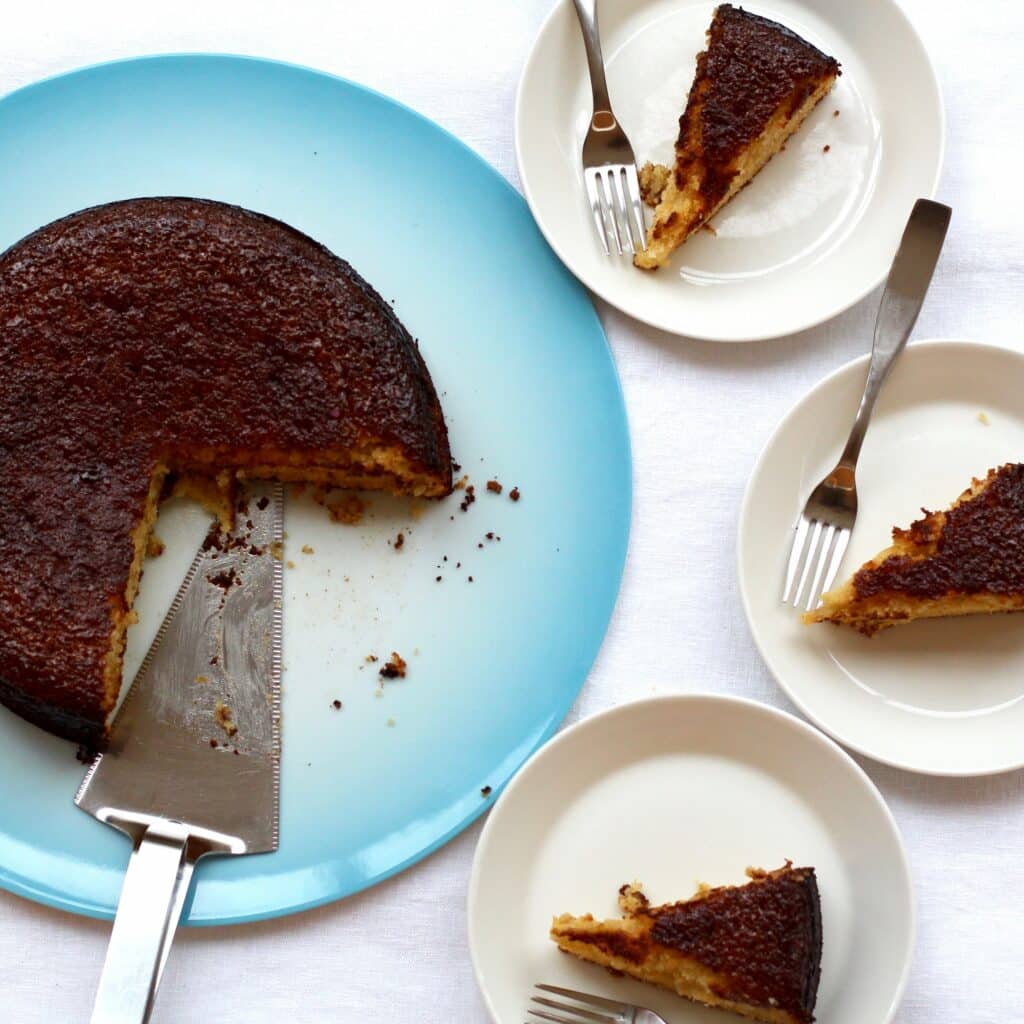Without a doubt, the culinary questions I am most frequently asked are baking related. It seems that while we all love eating them, some folks shy away from the opportunity to bake for fear of failure. We have all had them: collapsing, exploding, burnt messes in the oven. But there are a few simple, yet not totally obvious (if you have not been told) baking rules that can help alleviate stress and aid success.
Today, I apologise if you are an experienced and talented baker. If you do not need any baking tips, skip to the end of this post where you will find a recipe for Lemon Olive Oil Polenta Cake. It is a winner and dairy free to boot. However, if you are looking for a few simple pointers, please read on.
In my opinion, the secret to baking is understanding (a) a few key (basic) scientific formulas, (b) the importance of following the instructions and (c) being organised.
Mise en Place (which literally means putting in place) is a term regularly referred to in most professional kitchens re: setting up and organising a workspace, ingredients and tools. It is about the most transferable “cheffy” skill for the home cook. Think mindfulness in the kitchen. Taking the time to read the recipe, ensuring you have all the correct implements and enough of all the ingredients measured out to hand will produce a calm baker and avoid what I call “mid mix panic”
In short, here is a list of the most important things to remember when embarking on a baking session. These tips should ensure success and the joy of a sweet smelling kitchen.
- This point may sounds moronically basic, but when it comes to baking it is supremely important: Read the recipe from beginning to end before you do anything else. The order that ingredients are written is always the order that they are prepared or added. The method (and the order which the ingredients are added) can vary from recipe to recipe. Understanding what needs to be incorporated at every stage at the start eliminates any surprise half way through mixing, and most importantly keeps the baker calm.
- Before taking out a single ingredient, turn on the oven. Turning the oven on as you start to gather your ingredients ensures that it is hot when everything is mixed together and ready to go in. When you bake, the moment the wet ingredients and the dry ingredients (ie.raising agents) are mixed, the chemical reaction of rising begins. If you oven is not hot, and your cake is sitting on the side waiting for the oven to heat up, it will not rise fully as the action started in the cool kitchen rather than the hot oven.
- Ensuring that you have the right size pan at the start eliminates any last minute panic once ingredients are mixed. It also means you can scale a recipe up or down at the beginning to suit if you don’t have quite the right size or shape. This is also why recipes tell you to grease or line it at the very start. You don’t want to be messing around with parchment paper and softening butter while your finished cake is ready to be poured into the pan. Remember the raising agents!
- Measure out all your ingredients before you start mixing. You will know immediately if you are missing anything (and can therefore adjust accordingly if possible). Also, you are less likely to forget to add an ingredient if they are all there and in the forefront of your memory. Plus it makes the actual mixing time very quick and efficient as you are not scurrying around the kitchen cursing and making a mess.
- Follow the instructions verbatim. They are there to guide and ensure success at the end. If a recipe tells you to cream the butter and sugar for 3-5 minutes, don’t do it for less. The pale and fluffy start to the cake will help the eggs incorporate fully and keep the finished product light and fluffy. Wonder why yours sometimes is flat and dense? Maybe you did not whisk enough at the begining? Just a thought. It makes a difference. The same rule applies to the order the ingredients are added and the duration of mixing at each stage (see above). Please don’t overmix the flour into the wet ingredients. The gluten in the flour will develop too much and it will make your cake tough. Everyone tells you. There is a reason. It is science after all!
The only other tip I would add is try not to multitask while baking (think back to the mindfulness analogy). Being organised, present and clear about the task ahead is really half of the battle, and really can make the whole experience quite relaxing. Plus, taking a magnigficent sugary treat to the table is immensely satisfying, so quash your inner baking demons and turn on the oven!
I would love to know if any of these pointers helped. Please do get in touch and share your best baking tips or ask me any baking related (or cooking) questions that you might have.
This journal entry originally appeared as the intro to my Lemon Olive Oil Polenta Cake.
